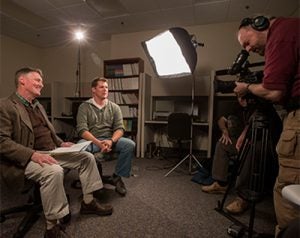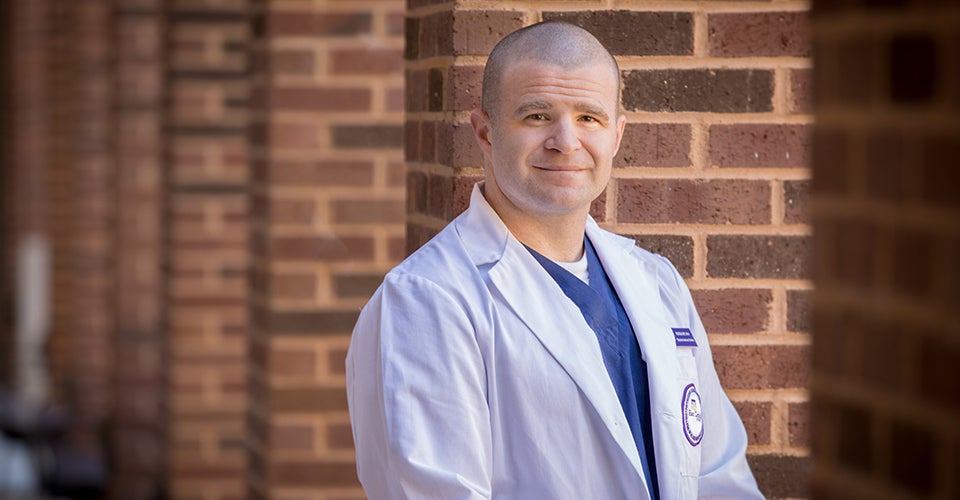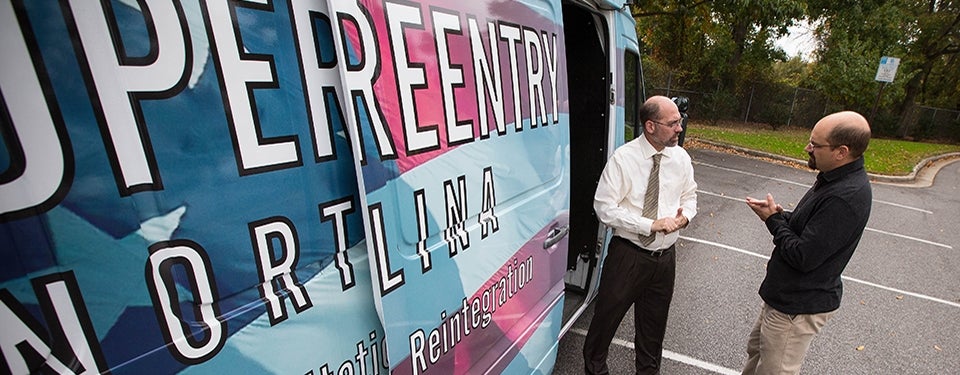SERVING THOSE WHO SERVE
Allied Health disciplines improve life for service members, veterans
The accolades have been numerous – East Carolina University is recognized nationally as a university dedicated to those who have served in the Armed Forces. And for the College of Allied Health Sciences, that dedication comes from every facet.
“We are located in one of the most dense military crescents within the entire U.S., stretching from Washington, D.C. through North Florida,” said ECU Provost Ron Mitchelson. “It makes great sense for the military to be an important part of our vision because we have very strong academic and research programs that are attractive to our active military and our veterans.
“In addition, our distance education offerings provide the kind of flexibility and accessibility that our service men and women need.”
The college’s faculty, staff and students include former military service members, current members of the Reserves and those who are serving abroad. Beyond the personal narratives of service woven into the mission of the college itself, the academic programs and assistance-focused resources it offers reach out into the region to improve the quality of life for veterans.
Dr. Paul Toriello, chair of the Department of Addictions and Rehabilitation Studies, says the college has a desire to reach out to the veteran population – along with others in need – to help connect them with services they often otherwise don’t know are there for them.
“People want to help those who have served,” Toriello said. “It is a passion of the college as a whole.”
From classroom to community
For some faculty in Addictions and Rehabilitation Studies, that enthusiasm encompasses both educating students and providing specific resources to those in need-including veterans.
The Navigate Counseling Clinic, under the direction of Dr. Celeste Crawford and run by faculty and graduate students, provides hands-on training for future professionals while bridging gaps between people and services including employment, addiction counseling and veterans-specific counseling.
Going a step further, a mobile clinic for homeless veterans through Operation Reentry puts these services on the road, finding veterans where they are and providing as much assistance as they are interested in, with issues from biomedical or vocational to relationships.
“Our interaction with them is brief but impactful,” Toriello said.
Jim Menke, military research liaison and project manager for Operation Re-entry North Carolina, said that ORNC and the College of Allied Health have a unique relationship that lends itself to finding solutions to the difficult challenges facing veterans today.

Dr. Mark Stebnicki prepares to conduct an interview with military veteran Ty Shaw for use in a distance education course in military and trauma counseling. (Photo by Cliff Hollis)
“This work is providing needed vocational and behavioral health counseling assistance to veterans where they are,” Menke said.
The benefit is not only to the veterans who receive counseling or other types of assistance. The students earn practice and get a glimpse of the challenges other people face.
“Our students have a lot of pride in what they do,” Crawford said. “They feel like they are really doing something, not just training. To feel humbled is an invaluable way to start your career.”
Many of the college’s services are made possible through grants from agencies including the Department of Defense and Substance Abuse and Mental Health Services Administration (SAMHSA).
Toriello secured an additional grant from SAMHSA to help veterans make connections and improve their lives through technology. In its third year, more than 300 participants are using texting, e-mail, message boards and other technology to rebuild relationships, learn about and apply for jobs, and reconnect with society.
To Toriello, educating students and using professional expertise is only a part of the faculty’s duty – serving those who have served the country through programs and grants is the natural next step.
“It’s the least we can do,” he said.
Entrenched in service
Dr. Mark Stebnicki wanted to find a way to do more, too.
The professor in Addictions and Rehabilitation Studies and coordinator of the military and trauma counseling graduate certificate program wanted to train students to understand all aspects of military culture that can present challenges for veterans-psychosocial, vocational and mental health.
“It seemed natural that our students would likely see a veteran client with some of these,” Stebnicki said.
Those trained to treat veterans need to understand the medical, physical, psychological and career needs of service members, Stebnicki said. The certificate provides graduates the skills needed to aid military personnel and veterans with that transition after service is complete.
Pat Frede’s day-to-day duties as director of development and gift officer for allied health keep her challenged as well, but both entities are supportive when Frede is deployed as part of the U.S. Navy Reserve. She has deployed in past years to Afghanistan and Djibouti.
“I got to come back to the same job, and the same desk,” Frede said. “Not everyone is that lucky.”
Serving her country allowed Frede to also witness other cultures, people and languages, but also to do what she could to ensure that people were better off because Frede and her fellow troops.
“Being in the military has changed my life,” she said. “It’s taught me to be a stronger person inside and out.”
Foster Hunt, a graduate student studying to become a physician assistant, learned similar lessons during his time in the military. He saw active duty in the U.S. Marines and still lives a mission of service.
“It has always been an integral part of my plan to work with veterans, and I’m learning to expand my view of the many ways and places I can serve veterans,” Hunt said. “[CAHS] has made it possible for me to advance and further myself and my education.”
Hunt also captures the feeling of many faculty, staff, and students in CAHS who either have ties to the military or want to use their expertise to improve the lives of those who have served.
“Just like having strong, successful Marines by my side,” he said. “I think it’s important to contribute to living in a healthy community. My community is a direct reflection of me.”

Graduate student Foster Hunt has shaped his Physician Assistant Studies coursework to reflect his interest in aiding veterans. (Photo by Patrick Fay)
